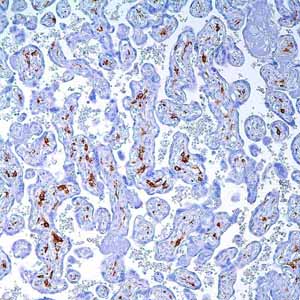
CD163 (MRQ-26)

CD163 was recently identified as an acute phase-regulated transmembrane protein whose function is to mediate the endocytosis of haptoglobin-hemoglobin complexes. This receptor is expressed on the surface of monocytes (low expression) and tissue macrophages [also known as histiocytes] (high expression). It is a member of the cysteine-rich scavenger receptor superfamily, encoded by a gene localized on human chromosome 12p13.3. Solubilized in plasma, CD163 functions as an anti-inflammatory signal and has many roles in disease processes that range from autoimmune conditions such as rheumatoid arthritis to atherosclerosis. Previous work has shown that the CD163 gene can be regulated by glucocorticoids, IL-10, and other inflammatory modulators, and is highly expressed in inflamed tissues, consistent with its role in the resolution of inflammation.
Staining for CD163 has been helpful in distinguishing synovial macrophages from synovial intimal fibroblasts in the setting of rheumatoid arthritis, where its specificity for macrophages was found to be superior to that of CD68, which does not discriminate between these cell types. Increased levels of CD163 were also detected in patients with microbial infections and myelomonocytic leukemias by an enzyme-linked immunosorbent assay. Flow cytometry studies have confirmed that CD163 expression is limited to leukemias with monocytic differentiation. Another recent study showed that all 5 cases of synovial-type giant cell tumors of the vertebral column stained for CD163.
